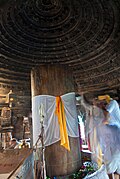Matangeshvara Temple, Khajuraho
| Matangeshvara temple | |
|---|---|
मतंगेश्वर मन्दिर | |
 | |
| Religion | |
| Affiliation | Shaivism |
| District | Chhatarpur |
| Deity | Matangeshvara (an aspect of Shiva) |
| Location | |
| Location | Khajuraho |
| State | Madhya Pradesh |
| Country | India |
| Geographic coordinates | 24°51′07″N 79°55′18″E / 24.8519316°N 79.9216873°E |
| Architecture | |
| Date established | 11th century CE |
The Matangeshvara temple (IAST: Matangeśvara Mandir) is a Shiva temple in the Khajuraho town of Madhya Pradesh, India. Among the Chandela-era monuments of Khajuraho, it is the only Hindu temple that is still actively used for worship. As part of the Khajuraho Group of Monuments, the temple was inscribed on the UNESCO World Heritage List in 1986 because of its art, architecture, and testimony to the Chandela culture.[1]
History
[edit]The Archaeological Survey of India (ASI) assigns the Matangeshvara temple to 900-925 CE, because it has a plain design unlike the later temples of Khajuraho.[2] However, scholar Rana P. B. Singh assigned it to approximately 1000 CE.[3]
The temple has been classified as a Monument of National Importance by the ASI.[4]
According to the history, a sage named Matanga manifested in form of a lingam, and controlled the god of love. His hermitages were located at Khajuraho, Kedarnath, Varanasi and Gaya. These are now the sites of four Matangeshvara ("Lord of Matanga") temples. Another account states that the temple is named after an aspect of Shiva who controlled the god of love.[5]
Art and architecture
[edit]The Matangeshvara temple is a larger-scale version of the Brahma temple in terms of plan and design.[2] It has a square plan. It houses a 2.5 m high lingam, which is 1.1 m in diameter. The base platform of the lingam is 1.2 m high and 7.6 m in diameter.[6] The lingam has Nagari and Persian inscriptions.[2]
-
Ganesha statue at the entrance
-
The interior of the temple
-
Ceiling cusps
The Matangesvara temple is the plainest looking among the sandstone temples of Khajuraho.[2] It is not richly decorated: its interior walls, exterior walls and curvilinear tower are devoid of carvings.[7] The ceiling features elementary floral cusps.[2]
Present use
[edit]Among the Hindu temples of Khajuraho, the Matangeshvara temple is the only widely active site of worship.[6] Around Shivaratri in February or March, a three-day ceremony is organized here to celebrate Shiva's marriage. It is attended by around 25,000 people. The lingam is bathed, dressed and decorated like a human bridegroom during the ceremony.[8]
References
[edit]- ^ "Khajuraho Group of Monuments". UNESCO World Heritage Centre. United Nations Educational Scientific and Cultural Organization. Retrieved 25 June 2023.
- ^ a b c d e ASI Bhopal Matangesvara 2016.
- ^ Rana P. B. Singh 2009, p. 58.
- ^ ASI MP List 2016.
- ^ Rana P. B. Singh 2009, pp. 61–62.
- ^ a b Rana P. B. Singh 2009, p. 61.
- ^ Ali Javid & Tabassum Javeed 2008, p. 201.
- ^ Rana P. B. Singh 2009, p. 62.
Bibliography
[edit]- Ali Javid; Tabassum Javeed (2008). World Heritage Monuments and Related Edifices in India. Algora. ISBN 978-0-87586-482-2.
- "Matangesvara Temple". Archaeological Survey of India, Bhopal Circle. Retrieved 16 November 2016.
- "Alphabetical List of Monuments - Madhya Pradesh". Archaeological Survey of India, Bhopal Circle. Archived from the original on 2 November 2016. Retrieved 16 November 2016.
- Rana P. B. Singh (2009). Cosmic Order and Cultural Astronomy. Cambridge Scholars. ISBN 9781443816076.





